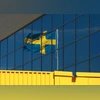Turkey's parliament approves Sweden's Nato membership, lifts key hurdle
Sweden has pledged deeper cooperation with Turkey on counterterrorism and to support Turkey's ambition to revive its EU membership bid
)
Photo: Pexels
Turkish legislators on Tuesday endorsed Sweden's membership in Nato, lifting a major hurdle on the previously nonaligned country's entry into the military alliance.
The legislators ratified Sweden's accession protocol by 287 votes to 55, with four abstentions. The ratification will come into effect after its publication in the Official Gazette, which is expected to be swift.
Hungary then becomes the only Nato ally not to have ratified Sweden's accession.
Today we are one step closer to becoming a full member of Nato, Swedish Prime Minister Ulf Kristersson wrote on X, the platform formerly known as Twitter. The U.S. Ambassador to Turkey, Jeff Flake, also welcomed the Turkish parliament's decision calling it a great move for Sweden, Turkey and Nato.
Nato-member Turkey had been delaying Sweden's membership for more than a year, accusing the country of being too lenient toward groups that Ankara regards as security threats. It has been seeking concessions from Stockholm, including a tougher stance toward Kurdish militants and members of a network that Ankara blames for a failed coup in 2016.
Also Read
Turkey had also been angered by a series of demonstrations by supporters of the outlawed Kurdistan Workers' Party, or PKK, in Sweden as well as Quran-burning protests that roiled Muslim countries.
Last month, parliament's foreign affairs committee gave its consent to Sweden's bid in the first stage of the legislative process, after Turkish President Recep Tayyip Erdogan sent its accession protocol to lawmakers for approval.
In the past, Sweden was a country that had become a center in Europe in terms of the existence and of the activities of the PKK, Fuat Oktay, a senior legislator in Erdogan's governing party and the head of the parliament's foreign affairs committee told parliament.
Sweden had since, among other things, amended its anti-terrorism laws, curbed the PKK's financial activities, convicted a suspect for alleged money laundering and financing terrorism, extradited another suspect and lifted restrictions on arms sales to Turkey, he said.
PKK-affiliated circles no longer find a comfortable room for maneuver in Sweden as they did in the past, Oktay said, explaining why the ruling party was now supporting Stockholm's bid.
Sweden has pledged deeper cooperation with Turkey on counterterrorism and to support Turkey's ambition to revive its EU membership bid.
Turkey's main opposition party also supported Sweden's membership in the alliance but a centre-right party and the country's pro-Kurdish party were among parties that opposed it.
Sweden's steps concerning its extradition of wanted criminals or the fight against terrorism have remained limited and insufficient, Musavat Dervisoglu, a legislator from the Good Party told parliament.
Erdogan has linked ratification of Sweden's Nato membership to the US Congress' approval of a Turkish request to purchase 40 new F-16 fighter jets and kits to modernize Turkey's existing fleet. He has also urged Canada and other Nato allies to lift arms embargoes on Turkey.
Koray Aydin, another Good Party legislator, urged parliament to hold out on ratifying Sweden's accession until the F-16 sales and the modernisation kits are approved in Washington, saying Turkey would lose an important bargaining chip.
US President Joe Biden's administration never formally tied the sale of the F-16s to Turkey's ratification of Sweden's Nato membership. However, numerous influential members of Congress had said they would not support the sale unless and until Turkey signs off on Sweden's accession to the alliance.
Administration officials say they expect relatively quick action on the F-16 sale after Turkey's ratification of Sweden's Nato membership.
In Washington, National Security Council spokesman John Kirby said that Sweden is more than ready to become a Nato ally.
He added, It's time for Sweden to become a Nato ally. They have a modern, advanced military-- one that we're very comfortable with. And they'll add real significant military capabilities to the alliance.
Sweden and Finland abandoned their traditional positions of military nonalignment to seek protection under Nato's security umbrella, following Russia's invasion of Ukraine in February 2022. Finland joined the alliance in April, becoming Nato's 31st member, after Turkey's parliament ratified the Nordic country's bid.
Hungary has also stalled Sweden's bid, alleging that Swedish politicians have told blatant lies about the condition of Hungary's democracy. Hungary has said it would not be the last to approve accession, although it was not clear when the Hungarian parliament intends to hold a vote.
Hungarian Prime Minister Viktor Orbn announced Tuesday that he sent a letter to his Swedish counterpart, Ulf Kristersson, inviting him to Budapest to discuss Sweden's entry into Nato.
Nato requires the unanimous approval of all existing members to expand, and Turkey and Hungary were the only countries that have been holding out, frustrating other Nato allies who had been pressing for Sweden and Finland's swift accession.
(Only the headline and picture of this report may have been reworked by the Business Standard staff; the rest of the content is auto-generated from a syndicated feed.)
More From This Section
Don't miss the most important news and views of the day. Get them on our Telegram channel
First Published: Jan 24 2024 | 7:12 AM IST


